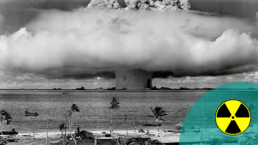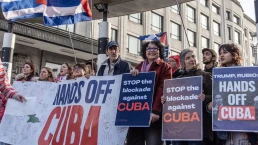In the waxing and waning of public attention, the threat posed by nuclear weapons can feel distant. But decisions made right now will be impacting us for decades – and centuries – to come.
By Tamar Sarai Davis, Prism
This must read from Prism contains summaries of new and old campaigns around nuclear weapons and the threat of nuclear war. Some of them address the harm caused by mining and the nuclear industry. Others zero in on the budgetary madness of our ICBM program. In some cases, the primary victims are marginalized communities such as Native American tribes, whose lands and health have been exploited mercilessly. We’re excerpting the section featuring our own Marena Blanchard. Worth reading the entire piece.
Security doesn’t mean nuclear weapons
Marena Blanchard, a Oakland-based organizer and a campaigner with Roots Action, is working alongside Arianna Nason, a Minnesota-based organizer, in a forthcoming coalition-based campaign calling for the abolition of Intercontinental Ballistic Missiles (ICBMs). As part of a larger landscape that makes up the military industrial complex, ICBMs are missiles designed to deliver nuclear warheads, and the U.S. currently has a stock of 400 that are set to expire by 2030. The Air Force plans on replacing this current stock with a new ICBM system currently under development known as Ground-Based Strategic Deterrent (GBSD). Rather than extend the life of existing ICBMs, the Office of the Secretary of Defense argues that an investment in GBSD will lower sustainment costs of the life cycle of the program and include modernized launch facilities, improved command and control, and increased safety and security. The program will cost about $100 billion to acquire and $264 billion over its 50-year life-cycle.
“Generally speaking, the military industrial complex is a threat to all life on Earth but one of the deadliest dangers are nuclear weapons,” said Blanchard. “Colonizers have weaponized the very building blocks of life, taking aim at the stewards of life around the world: Indigenous people.”

The ICBM abolition campaign will officially launch in January and feature a microsite with background information, an interactive timeline, and multiple resources to help the public engage and create enough people power to mobilize against the continued use and storage of ICBMs. While nuclear testing sites, waste facilities, and abandoned mines litter so much of the American landscape, the havoc they have wrought to the environment and the health defects they have caused to surrounding communities—often due to radioactive exposure—aren’t always visible in public policy discussions. However, Blanchard and Nason say that there are key ways to help make the issue more resonant, perhaps the most effective being drawing connections between ICBM abolition and other issues that capture people’s hearts, minds, and attention. In much the same way that the surge of interest in the movement against policing last year helped to shift common understanding of public safety as reliant on police presence, anti-militarism campaigns are also seeking to challenge the idea that nuclear weapons offer security.
“There’s this prevailing militaristic idea that somehow having these weapons of mass extinction makes us safer when it’s actually the inverse that’s true,” said Blanchard. “These weapons make us all at risk. All life on Earth is at risk because these weapons can destroy so much.”
Making those definitions stick also required crafting a new framework for how to manage conflict. Organizers like Blanchard and Nealson are looking to other movements such as the disability rights movement and the movement for prison abolition to see if there are ways to transfer and scale the methods and models these movements use to cultivate community care and conflict management without the use of extreme violence.
In addition to subverting ideas of security as being synonymous with militarism and the possession of nuclear weapons, all campaigns and protests against new mining, testing, and nuclear development must contend with the perceived tangible benefits that those new projects offer. A particularly difficult one is the employment opportunities that the nuclear weapons production industry may provide. Reframing public perceptions to consider whether job security and economic stability are worth the risk of radioactive contamination and exposure is still an uphill battle, particularly given the pandemic and its effect on the job market.
“Yes, in theory, there are decently paying jobs out there, but they’re not sustainable, they’re not long term, and ultimately, they’re going to have a much larger negative impact on the community and on the environment,” Nason said. “[We’re] trying to encourage folks to think forward instead of thinking of fear and loss. Just because we’re being offered something right now, does not mean that that is the healthiest option.”
Nason says instead that investing in skills development and re-establishing a connection to the environment—the land and the water—can create sustainable ways of life. That can also occur in part through the investment in green renewable energy, what Blanchard describes as “a just transition from extractive industries into something that’s life affirming.”
Anxieties around one’s economic well-being can also be better addressed by looking at ICBM abolition through the invest-divest framework that entered the mainstream last year in conversations about defunding the police, Blanchard says. Particularly in the midst of a pandemic where over 5 million Americans are estimated to have lost their health insurance, the perception that the government remains apathetic about the well-being of its citizens and “that people are really on their own” is stark, especially in light of how much the government invests in military weapons and systems—many of which require workers to risk their health and lives to be created in the first place.
“So when we talk about the billions of dollars going into the ‘modernization’ of these weapons of mass extinction, we can talk about a divest-invest framework where if we didn’t put money towards that, [imagine] the potentiality of what we could put the money towards, the quality of life that people could have,” Blanchard said.
As the campaign’s full rollout approaches, Blanchard and Nason are encouraging the public to keep an eye on the release of President Biden’s Nuclear Posture Review, a document that will lay out his administration’s approach to the country’s nuclear weapons policy. They have deep faith in the organizing efforts unfolding across the country in opposition to new nuclear-related projects and in their ability to amass the people power needed to win.
The fight for individuals and communities to be compensated for damage created by radiation has been spearheaded by those most affected—and their fight has always been made more difficult by government unwillingness to acknowledge its full culpability and to value human life higher than the legislations’ price tag. Nuclear abolitionists, however, are hoping to show that the very type of harm that necessitated legislation like RECA could be prevented by reconceiving our notions of what security actually looks like and what it takes to create and maintain it. True security, they argue, can’t rely on the same government policies that created—and then concealed—the very activities that compromised the safety of some of America’s most vulnerable.
“I’m very hopeful,” Nason said. “I’m hopeful.”
Recent Posts
Leading Papers Call For Destroying Iran To Save It
February 11, 2026
Take Action Now The opinion pages of the New York Times and Washington Post are offering facile humanitarian arguments for the US to escalate its…
Despite Marco Rubio’s Warnings, This is the Time to Go to Cuba in Solidarity Against the Latest U.S. Aggressions
February 10, 2026
Take Action Now When visiting Cuba, one can see quickly the terrible effects of the almost seven decades of the U.S. economic blockade of Cuba.By…
“Hands Off Cuba!”: Left Groups in Europe Mobilize Against U.S. Aggression
February 10, 2026
Take Action Now Hundreds demonstrated in Belgium in solidarity with Cuba as further mobilizations against US imperialism are planned across Europe.……
Democrats Propose Minor Reforms for ICE — and Record Funding
February 10, 2026
Take Action Now Congressional Democratic leaders are asking ICE to agree to reforms, promising to vote for $11 billion in funding for the agency if…




